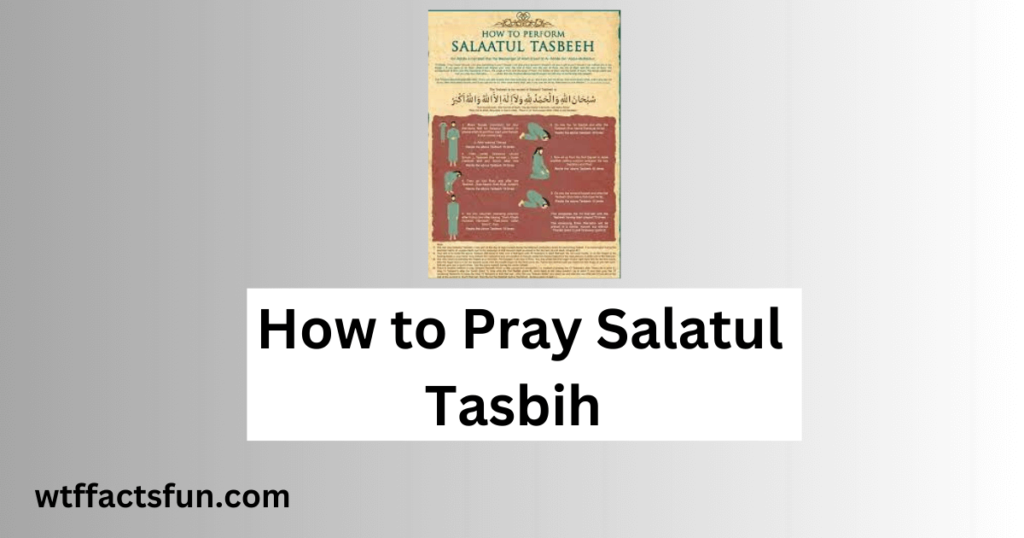
Table of Contents
How to Pray Salatul Tasbih
How to Pray Salatul Tasbih: Salatul Tasbih, a special prayer known for its spiritual significance, offers a unique opportunity for Muslims to engage in intense remembrance and seek forgiveness from Allah. In this comprehensive guide, we will delve into the origins, significance, and step-by-step instructions for performing Salatul Tasbih, a form of prayer cherished for its profound impact on spiritual growth.
Understanding Salatul Tasbih:
Salatul Tasbih is a voluntary prayer that involves the recitation of specific phrases glorifying and praising Allah. This prayer holds great merit, and many scholars emphasize its benefits, including the forgiveness of sins and the elevation of one’s spiritual status. The Prophet Muhammad (peace be upon him) is reported to have recommended this prayer to his followers as a means of seeking divine mercy.
The Origin of Salatul Tasbih:
The foundation of Salatul Tasbih is rooted in a narration found in various Hadith collections, including Ibn Majah and Tirmidhi. The Prophet Muhammad (peace be upon him) is believed to have taught this prayer to his uncle, Al-Abbas ibn Abdul-Muttalib, as a means of seeking forgiveness and spiritual purification.
Significance of Salatul Tasbih:
Salatul Tasbih is considered a powerful supplication, and its significance lies in the act of remembrance and submission to Allah. The repetition of specific phrases during this prayer serves as a form of dhikr (remembrance), fostering a deep connection with the Divine and purifying the heart.
Performing Salatul Tasbih – Step by Step:
Step 1: Intentions (Niyyah)
Before starting Salatul Tasbih, one must make a sincere intention in their heart to perform this special prayer solely for the sake of Allah, seeking His mercy and forgiveness.
Step 2: Finding a Quiet and Clean Space
Choose a clean and quiet area where you can concentrate and engage in prayer without distractions. Performing Salatul Tasbih in a peaceful environment enhances the spiritual experience.
Step 3: Observing the Correct Time
Salatul Tasbih can be performed at any time of the day or night, except during the prohibited times for regular prayers (i.e., sunrise, sunset, and when the sun is at its zenith).
Step 4: Standing in Prayer
Begin Salatul Tasbih by standing in the qiyam position, facing the qibla, and raising your hands to commence the prayer. This is similar to the starting position for other prayers.
Step 5: Recitation of Takbir
Initiate the prayer by saying “Allahu Akbar” (Allah is the Greatest) and enter into the state of prayer.
Step 6: Recitation of Specific Phrases
In Salatul Tasbih, the worshipper recites specific phrases glorifying Allah. These phrases include the tasbih (glorification) of Allah, expressing His greatness, mercy, and majesty.
Step 7: Perform the Ruku (Bowing) and Sujood (Prostration)
Follow the customary prayer positions of ruku and sujood after the recitation of tasbih. Maintain focus on the divine connection during these physical acts of worship.
Step 8: Repeat the Process
Continue the cycle of recitation, bowing, and prostration, repeating the tasbih phrases as instructed. The prayer involves a series of cycles, and the worshipper may choose to perform a specific number of cycles based on personal preference or tradition.
Step 9: Tashahhud and Tasleem
Conclude Salatul Tasbih by reciting the tashahhud (testification of faith) and offering the tasleem (salutation).
Conclusion:
Salatul Tasbih is a remarkable and spiritually enriching form of prayer that provides Muslims with a unique opportunity to deepen their connection with Allah. The intentional remembrance and praise of the Divine during this prayer contribute to the purification of the soul and the seeking of forgiveness. As with any act of worship, sincerity and devotion are key elements in making Salatul Tasbih a meaningful and transformative experience. Regular incorporation of this special prayer into one’s routine can serve as a powerful tool for spiritual growth and reflection on the mercy of Allah.
Read also:
How to Clean Eze Breeze Windows